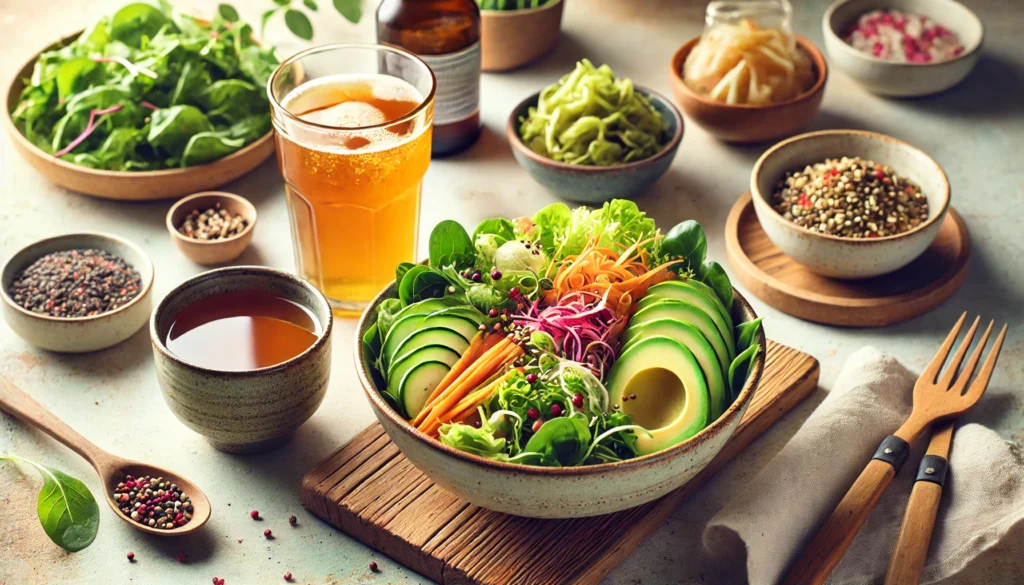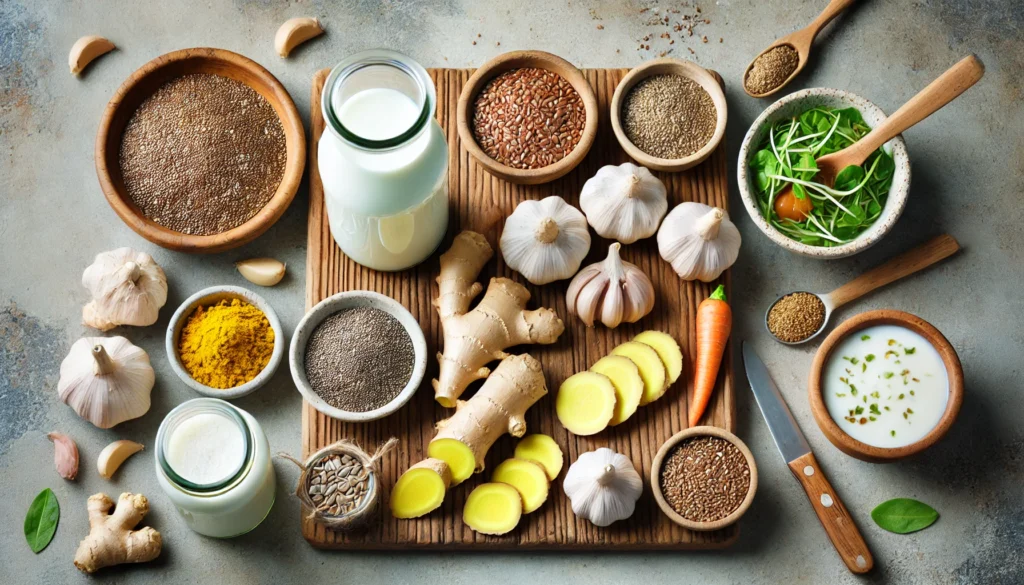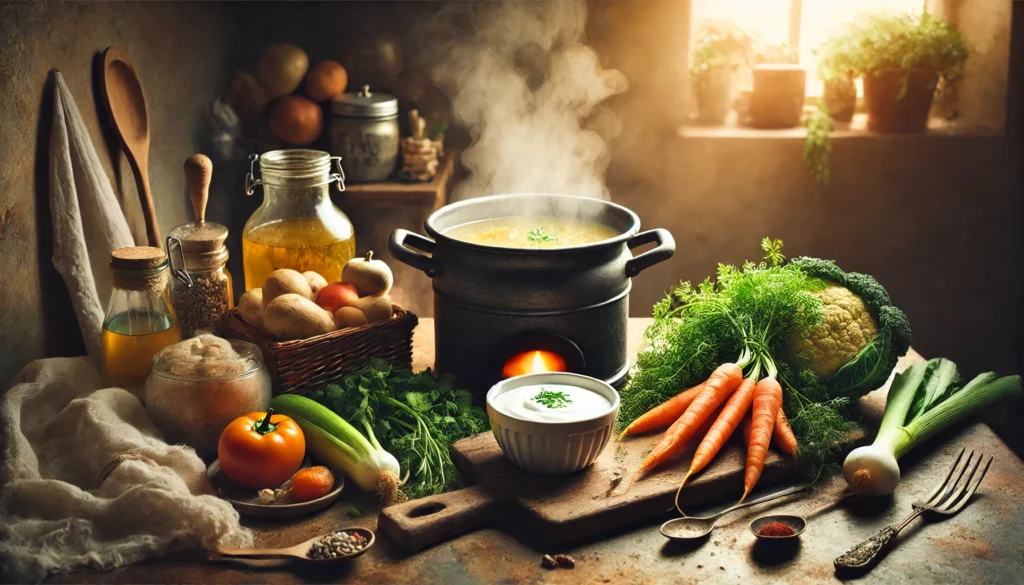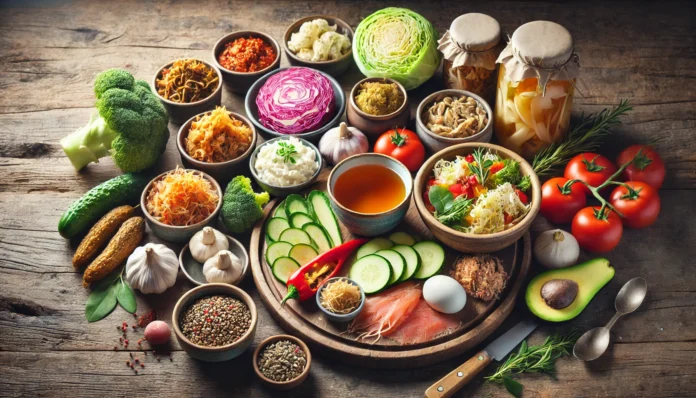Understanding Gut Health and Its Importance
The human digestive system is a complex network of organs, microbes, and biochemical processes that work in harmony to maintain overall health. Gut health is not just about digestion; it plays a crucial role in immune function, mental well-being, and even chronic disease prevention. An unhealthy gut can lead to conditions such as irritable bowel syndrome (IBS), leaky gut syndrome, and even mood disorders like anxiety and depression. Healing your gut naturally involves a holistic approach that includes diet, lifestyle changes, and mindful eating habits. Understanding how to repair stomach lining naturally can pave the way for improved overall health and well-being.
You may also like: How to Improve Gut Health Naturally: Science-Backed Tips for a Stronger Microbiome
The Role of the Gut Microbiome
At the core of gut health lies the gut microbiome, a vast ecosystem of bacteria, fungi, and other microbes that live within the intestines. These microorganisms help break down food, synthesize vitamins, and support immune defenses. A balanced gut microbiome contributes to efficient digestion and nutrient absorption, while an imbalanced one can lead to inflammation, bloating, and food sensitivities. Research suggests that gut dysbiosis, an imbalance of gut bacteria, is linked to autoimmune diseases, obesity, and even neurological disorders. A gut healing diet that nurtures beneficial bacteria can help restore balance and optimize digestive function.
Common Signs of an Unhealthy Gut
Recognizing the signs of poor gut health is the first step toward healing. Common symptoms include bloating, constipation, diarrhea, acid reflux, and frequent infections. Chronic fatigue, skin conditions like eczema, and even brain fog can also be indicative of gut-related issues. Many individuals overlook digestive discomfort and accept it as normal, but persistent symptoms should not be ignored. Addressing gut health through dietary and lifestyle modifications can alleviate these symptoms and restore digestive balance.

How to Heal Your Gut Naturally
Healing the gut naturally requires a multifaceted approach that includes eating gut healing foods, reducing inflammation, and eliminating gut irritants. The process takes time and consistency, but with the right strategy, it is possible to achieve lasting digestive health.
1. Eliminating Gut Irritants
The first step in gut repair is removing foods and substances that damage the digestive lining. Processed foods, artificial sweeteners, excessive alcohol, and refined sugars contribute to inflammation and microbial imbalances. Additionally, gluten and dairy are common triggers for gut sensitivity and should be reduced or eliminated if they cause discomfort. Chronic stress and excessive antibiotic use can also harm gut health, making it essential to address these factors for long-term healing.
2. Incorporating Gut-Healing Foods
A diet rich in gut-healing foods can restore the stomach lining and support beneficial bacteria. Bone broth, which is packed with collagen and amino acids like glutamine, helps repair the intestinal lining. Fermented foods such as sauerkraut, kimchi, and kefir introduce probiotics that promote microbial balance. Prebiotic-rich foods like garlic, onions, and bananas feed beneficial bacteria, further enhancing gut health. By incorporating these gut healing foods, individuals can accelerate the healing process and support digestive resilience.
3. Supporting Digestive Enzymes and Stomach Acid
Proper digestion begins with adequate enzyme production and stomach acid levels. Many individuals suffer from low stomach acid, leading to indigestion, bloating, and nutrient malabsorption. Apple cider vinegar and lemon water before meals can stimulate stomach acid production, improving digestion. Digestive enzymes, found in pineapple and papaya, can also aid in breaking down proteins and reducing gut strain. These natural remedies enhance nutrient absorption and prevent digestive discomfort.
4. Managing Stress for Gut Repair
The gut-brain connection is a critical component of digestive health. Chronic stress activates the body’s fight-or-flight response, reducing blood flow to the gut and impairing digestion. Stress management techniques such as deep breathing, meditation, and gentle exercise can significantly improve gut function. Yoga and mindfulness practices have been shown to reduce inflammation and enhance gut motility. By prioritizing mental well-being, individuals can create an optimal environment for gut repair and healing.
5. Implementing a Gut Healing Diet
A gut healing diet emphasizes whole, nutrient-dense foods that nourish the intestinal lining and support microbial diversity. This approach includes a variety of fiber-rich vegetables, healthy fats, and quality proteins. Omega-3 fatty acids, found in salmon and flaxseeds, have anti-inflammatory properties that benefit gut health. Consuming a balanced diet with diverse plant-based foods fosters a resilient microbiome and improves digestion over time.
6. How to Heal Intestines After Antibiotic Use
Antibiotics, while essential in treating infections, can disrupt gut bacteria and weaken intestinal integrity. After antibiotic use, it is crucial to replenish beneficial microbes with probiotic-rich foods and high-quality probiotic supplements. Additionally, consuming resistant starches like cooked and cooled potatoes and green bananas can help reestablish gut flora. Rebuilding gut bacteria after antibiotics is essential for preventing digestive issues and maintaining long-term health.
7. Hydration and Gut Health
Proper hydration is often overlooked but plays a significant role in digestion and gut health. Water aids in breaking down food, preventing constipation, and flushing out toxins. Herbal teas, such as ginger and peppermint tea, have soothing properties that support gut function. Electrolyte balance is also vital for digestive processes, making coconut water and mineral-rich broths beneficial additions to a gut healing regimen.
The Long-Term Benefits of Gut Healing
Investing in gut health has far-reaching benefits beyond digestion. A healthy gut enhances immune function, reduces systemic inflammation, and even supports mental clarity. Emerging research highlights the connection between gut bacteria and neurotransmitter production, influencing mood and cognitive function. By prioritizing gut health, individuals can experience improved energy levels, clearer skin, and a stronger immune system.

Frequently Asked Questions (FAQ) on Gut Health and Healing
1. What are the first steps to repair stomach lining naturally?
Repairing the stomach lining naturally begins with reducing factors that contribute to irritation and inflammation. Processed foods, excessive alcohol, and NSAIDs like ibuprofen can weaken the stomach lining, so minimizing their intake is crucial. Incorporating foods rich in glutamine, such as bone broth and cabbage, helps promote mucosal repair, while polyphenol-rich foods like green tea and blueberries provide antioxidant protection. Additionally, mindful eating practices, such as chewing food thoroughly and eating in a relaxed state, support digestion and reduce stress on the gut. Combining these strategies with a gut healing diet can create an optimal environment for stomach lining regeneration.
2. How does a gut healing diet improve overall health beyond digestion?
A gut healing diet extends benefits far beyond digestion, impacting immune function, mental clarity, and even skin health. Since a significant portion of the immune system resides in the gut, optimizing microbial balance can enhance resistance to infections and reduce systemic inflammation. Additionally, gut bacteria play a key role in neurotransmitter production, influencing mood and cognitive performance. Skin conditions such as acne and eczema often improve with better gut health, as the digestive system efficiently eliminates toxins and reduces inflammatory responses. When the gut functions optimally, the body’s ability to absorb nutrients improves, leading to increased energy levels and better overall wellness.
3. What are some lesser-known gut healing foods that people overlook?
While common gut healing foods like yogurt and sauerkraut receive a lot of attention, several lesser-known options provide equally powerful benefits. Okra contains mucilage, which coats the digestive tract and soothes inflammation, making it beneficial for gut repair. Artichokes are rich in inulin, a prebiotic fiber that feeds beneficial gut bacteria and enhances microbial diversity. Seaweed provides unique polysaccharides that support gut lining integrity and encourage the growth of protective bacteria. Black garlic, a fermented version of regular garlic, offers high levels of antioxidants and prebiotic compounds that promote gut health. Incorporating these foods into a gut healing diet can significantly improve digestive balance and resilience.
4. How long does it take to heal intestines naturally, and what factors affect the timeline?
The time required to heal intestines naturally varies based on the severity of gut damage, dietary habits, and individual health conditions. Mild gut imbalances may improve within a few weeks, while more severe cases, such as leaky gut syndrome, may take several months of consistent dietary and lifestyle changes. Factors that influence healing include stress levels, the presence of underlying conditions like autoimmune diseases, and the extent of previous antibiotic use. Ensuring a consistent intake of gut healing foods, reducing inflammatory triggers, and managing stress through mindfulness techniques can accelerate the repair process. Every individual’s healing journey is unique, so patience and persistence are essential.
5. Can intermittent fasting support gut repair, and how should it be implemented?
Intermittent fasting can play a significant role in gut repair by allowing the digestive system time to rest and regenerate. During fasting periods, the body initiates autophagy, a process where damaged cells and proteins are broken down and recycled, contributing to intestinal healing. Shorter fasting windows, such as 12- to 16-hour fasts, are often sufficient to promote gut health without causing excessive stress. Consuming nutrient-dense meals during eating windows, including fiber-rich vegetables and healthy fats, ensures adequate nourishment for gut bacteria. However, individuals with compromised digestion should start with shorter fasting periods and gradually increase duration based on tolerance and energy levels.
6. How do you heal people in guts who struggle with chronic bloating and discomfort?
Healing chronic bloating requires identifying the root cause, which may stem from food intolerances, bacterial overgrowth, or impaired digestion. Keeping a food journal can help pinpoint trigger foods, while testing for conditions like small intestinal bacterial overgrowth (SIBO) may be necessary for persistent cases. Herbal antimicrobials such as oregano oil and berberine can help rebalance gut bacteria, reducing excessive fermentation that contributes to bloating. Chewing food thoroughly and incorporating digestive enzymes can enhance nutrient breakdown and absorption, easing digestive strain. A targeted gut healing diet with probiotic and prebiotic-rich foods can further support microbial balance and long-term digestive comfort.
7. What role do fermented foods play in gut repair, and are there any risks?
Fermented foods are a cornerstone of gut repair, as they introduce beneficial probiotics that enhance microbial diversity and digestive resilience. Foods like kimchi, miso, and tempeh provide live cultures that colonize the gut and support digestion. However, individuals with histamine intolerance or SIBO may experience adverse reactions, such as bloating or headaches, when consuming fermented foods. In such cases, starting with small amounts and gradually increasing intake can help assess tolerance levels. If symptoms persist, focusing on prebiotic-rich foods and taking high-quality probiotic supplements may be a better alternative for gut healing.
8. How does stress impact gut healing, and what are the best strategies to manage it?
Stress directly affects gut health by disrupting the gut-brain axis and altering microbial balance. Chronic stress increases cortisol levels, which can lead to intestinal permeability and inflammation, slowing the gut healing process. Practices such as diaphragmatic breathing, progressive muscle relaxation, and guided meditation have been shown to reduce stress and enhance gut function. Engaging in gentle movement, such as walking or yoga, supports digestion by stimulating the parasympathetic nervous system. Making time for restorative activities, such as reading or spending time in nature, further helps regulate stress responses and optimize conditions for gut repair.
9. Are there any gut healing foods specifically beneficial for mental well-being?
Several gut healing foods have profound effects on mental well-being due to their influence on gut bacteria and neurotransmitter production. Fatty fish, such as salmon and sardines, provide omega-3 fatty acids that reduce inflammation and support brain function. Dark chocolate contains polyphenols that enhance gut microbial diversity and boost serotonin levels, improving mood. Turmeric, with its active compound curcumin, has been shown to modulate gut bacteria and reduce symptoms of anxiety and depression. Kefir, a probiotic-rich fermented dairy product, has demonstrated benefits in balancing gut flora and promoting emotional resilience. By prioritizing these gut-nourishing foods, individuals can improve both digestive health and mental clarity.
10. What are the long-term benefits of maintaining a gut healing diet beyond symptom relief?
Maintaining a gut healing diet long-term extends benefits far beyond symptom relief, supporting longevity and disease prevention. A well-balanced gut microbiome contributes to reduced inflammation, lowering the risk of chronic conditions such as heart disease, diabetes, and autoimmune disorders. Improved gut health also enhances metabolic efficiency, leading to better weight management and sustained energy levels. Strengthening the gut lining through consistent consumption of gut healing foods prevents future digestive disorders and enhances nutrient absorption. As science continues to uncover the profound connections between gut health and overall well-being, it becomes clear that long-term gut care is an investment in both present and future health.

Conclusion: Achieving Lasting Digestive Wellness
Healing your gut naturally is a transformative journey that requires commitment and consistency. By following a gut healing diet, incorporating gut-healing foods, and reducing gut irritants, individuals can restore digestive health and enhance overall well-being. Understanding how to heal intestines and implement strategies for gut repair can prevent future digestive disorders and promote long-term vitality. With mindful eating, stress management, and a holistic approach to wellness, lasting digestive health is within reach.
gut microbiome health, digestive system repair, natural gut detox, probiotics for digestion, prebiotic foods list, leaky gut remedies, intestinal health support, stomach inflammation relief, microbiome balance, anti-inflammatory diet for gut, best foods for digestion, digestive enzymes benefits, healthy gut bacteria, colon health tips, holistic gut healing, fermented foods benefits, gut-brain connection, natural remedies for bloating, optimal digestion strategies, immune system and gut health
Further Reading:
How to Improve and Reset Gut Health
10 Foods This Nutritionist Eats That Support a Healthy Gut
4 Ways to Improve Gut Health & Reduce Inflammation
Disclaimer
The information contained in this article is provided for general informational purposes only and is not intended to serve as medical, legal, or professional advice. While Health11News strives to present accurate, up-to-date, and reliable content, no warranty or guarantee, expressed or implied, is made regarding the completeness, accuracy, or adequacy of the information provided. Readers are strongly advised to seek the guidance of a qualified healthcare provider or other relevant professionals before acting on any information contained in this article. Health11News, its authors, editors, and contributors expressly disclaim any liability for any damages, losses, or consequences arising directly or indirectly from the use, interpretation, or reliance on any information presented herein. The views and opinions expressed in this article are those of the author(s) and do not necessarily reflect the official policies or positions of Health11News.


